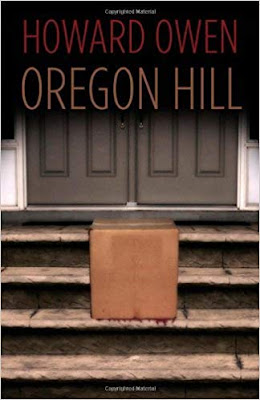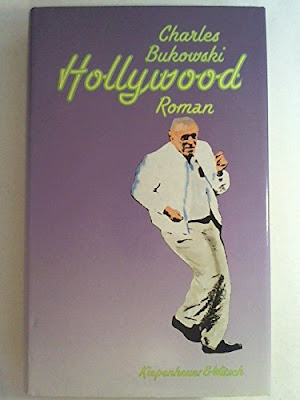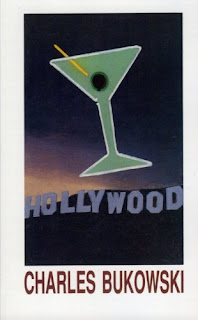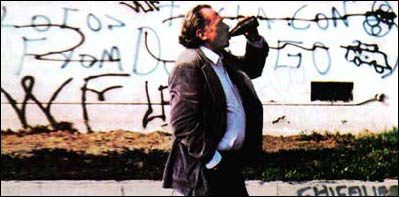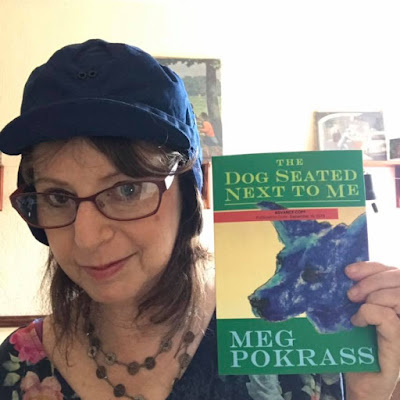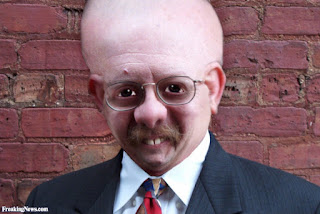Just
because it doesn't
take long to figure out whodunnit and whydunnit doesn't
mean we can't call Oregon
Hill a
mystery. And just because we're pretty sure we know who murdered Isabel
Ducharme, cut off her head and mailed it to her father doesn't mean
we have a leg up on our narrator, investigative newspaper reporter
Willie Black. He knows as much as we do because he's the one telling
us what we know, which is what he
knows. But being a newspaper reporter he has to nail
down
his suspicions and hunches before he can to put them
into the paper without getting the paper--and
himself--sued,
thus
costing him
his job. Willie has more at stake than we do in
keeping
suspicions tentative
as a check on leaping to premature conclusions.
We
as
readers have
only private pride on the line with our guesses. Engraved on the hard drive
of
a
professional skeptic like
Willie is the rule
of thumb, If
your mother says she loves you, check it out.
And
Willie
Black is already on the bubble. He's a drunk who's been demoted back
to the night police beat from covering the Virginia Legislature
because he refused an editor's request to sneak into a dying man's
hospital room to get a story. We also know he's carrying guilt for
writing stories that helped send a man to Virginia's gas chamber, who
was later proven innocent. On top of all this, Willie's newspaper's
been taken over by a chain that's squeezing the life out of it,
dumping employees overboard left and right (I almost wrote willy
nilly, but...well, you
know), and pressuring its editors to stem a bleeding circulation that
drags precious ad revenue down with it.
 |
| Howard Owen |
In
this dynamic of booze-sodden guilt versus very sober job peril
Willie stubbornly follows up on little indications police have
arrested the wrong man for murdering Isabel Ducharme. Willie is
virtually alone in this quest, angering his bosses, who don’t trust
his motives, the police, who are satisfied they’ve solved the case,
and the victim's mother, who believes he’s taking the side of the
man who killed her daughter, spits in his face when he goes to the
Ducharme home in search of information. Willie has a dicey history
with the police lieutenant who heads the investigation. They grew up
in the same tough neighborhood but had never been friendly. This
subtle enmity remains, in addition to their natural professional
adversity, and Willie admits to us he still finds the lieutenant
intimidating.
These
circumstances, the characters and dialogue, and the milieu in which
Willie Black persists in his search for the truth—both in the “word
factory,” as he calls the newspaper, and on the street, are
rendered with the realistic feel of someone who knows the terrain
from intimate experience. Howard Owen’s forty-four years in daily
journalism included a stint editing sports for The Richmond
Times-Dispatch. The city and the newspaper, which is unnamed, provide
the setting for the
novel. I
liked Oregon Hill so
much that I’ve downloaded Evergreen,
the last in the eight-book Willie Black series. I may even go the
whole stretch and read them all.
I
learned a long time ago that a writer should concentrate more on
showing the reader than in merely telling what things look like and
what takes place. In book reviews I’ve taken to providing an
example of the writing and voice, which are even more important to me
than simply plot. In that light, here’s a taste from one of my
favorite scenes in Oregon
Hill:
I
was waiting for the new one to brew when one of our Sarahs came in.
This one actually is named Sarah. Sarah Good-night. U.Va., Class of
’08. We generally have two kinds of people in our newsroom. We have
the old farts like me, mostly male, trying to hang on to our
sorry-ass jobs in a dying industry in a tanking economy. And you have
the Sarahs. They’re mostly women. They’re young, they’re
talented, they’re motivated, and they’re very politely, very
respectfully waiting for us to get the fuck out of the way so they
can get our jobs, which they’ll do just as well for about half the
salary. If we don’t get out of the way, they go to law school,
which many of them do anyhow.
Here’s
one more:
I
think I’m kind of a mascot for the kid reporters. They might not
want to be me, but they want to think that they work in a business
that has so-called characters (if not character) in it. think I’m
some kind of romanticized embodiment of a reporter who probably never
really existed, except in the minds of old-fart editors who
embellished and polished stories until the hopeless alcoholic with no
talent and less scruples—the guy they wished in hell many times as
deadlines were blown, participles were dangled and newsrooms were
trashed—morphed into a Bogart-Gable hybrid.
 |
| Richmond |
Speaking from personal
experience, that, my friends, is pretty damned close to how it was.
